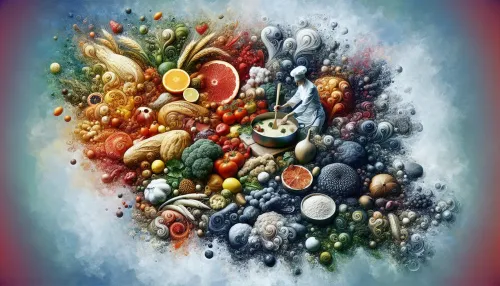Debunking the Detox Myth: Separating Fact from Fiction

It's not uncommon to hear about detox diets, teas, and cleanses that promise to rid your body of toxins and impurities, leaving you feeling rejuvenated and healthy. However, amid these claims, it's crucial to separate fact from fiction regarding the concept of detoxification.
Understanding the Body's Natural Detoxification Processes
The human body possesses remarkable natural detoxification mechanisms. Organs such as the liver, kidneys, and skin work harmoniously to eliminate harmful substances. The liver, in particular, plays a pivotal role in metabolizing and neutralizing toxins before they are excreted from the body.
Peppino Blog Tip: Emphasize that the body has its own efficient detox system, making external detox products unnecessary for most people.
Detox diets often involve strict dietary regimens aimed at eliminating alleged toxins from the body. These may include fasting or consuming specific foods or juices. While proponents claim weight loss and improved energy levels, the scientific basis for these assertions is often lacking.
Exploring the Science Behind Popular Detox Diets
It's important to note that severe diet restrictions can lead to nutrient deficiencies and potential health risks. Moreover, any initial weight loss on detox diets is usually due to water weight and not fat loss.
Detox teas and cleanses have gained popularity for their alleged ability to cleanse the body. However, many of these products contain laxatives and diuretics that can lead to dehydration and electrolyte imbalances. The weight loss experienced while using these products is often transient and primarily due to fluid loss.
Moreover, relying on such products can interfere with the body's natural digestive processes, potentially leading to long-term gastrointestinal issues.
Related Article: The Ultimate Guide to Holistic Nutrition for Vibrant Health
The Truth About Detox Teas and Cleanses
The concept of detoxification has become rife with myths. One prevalent misconception is that detoxing can cure various ailments ranging from chronic diseases to minor ailments like acne and bloating. In reality, there is insufficient scientific evidence to support these claims.
Additionally, the idea that certain foods possess miraculous detoxifying properties may contribute to a skewed understanding of nutrition.
Busting Common Myths About Detoxing
Extreme detox methods, such as prolonged fasting or drastic calorie restriction, can have adverse effects on overall health. These approaches can lead to nutrient deficiencies, weakened immunity, and even disrupt normal metabolic functions.
While short-term fasting has shown some health benefits in specific contexts, extreme detoxing should be approached with utmost caution and preferably under professional supervision.
Related Article: Nutritional Advances: Optimizing Diet for Enhanced Wellness
Unveiling the Potential Dangers of Extreme Detoxing
A balanced diet rich in fruits, vegetables, whole grains, lean proteins, and healthy fats supports the body's natural detoxification processes. Certain nutrients like antioxidants found in berries or sulfur compounds in cruciferous vegetables can enhance liver function and aid in toxin elimination.
It's essential for individuals to focus on maintaining a well-rounded diet rather than relying solely on periodic detox regimens.
Peppino Blog Insight: Advocate for a sustainable approach to nutrition that promotes long-term health instead of quick-fix detox solutions.
Evaluating the Role of Nutrition in Supporting Natural Detoxification
Incorporating fundamental lifestyle practices supports the body's natural detoxification mechanisms. Regular physical activity stimulates circulation and enhances the body's ability to eliminate waste products. Hydration also plays a crucial role in ensuring optimal kidney function for toxin excretion.
These evidence-based strategies foster holistic wellness without resorting to drastic or fad detox programs.
The term "detoxifying foods" has become pervasive in wellness circles but may perpetuate misconceptions about their actual effects on the body's cleansing processes. Instead of fixating on individual foods with purported detox properties, it's more valuable to focus on a comprehensive dietary approach that supports overall health.
Related Article: The Truth Behind Superfoods: Separating Hype from Reality
Offering Evidence-Based Strategies for Healthy Detoxification
Addressing this misconception promotes a balanced view of nutrition and reduces reliance on fad food trends associated with detox claims.
In conclusion, promoting a nuanced understanding of detoxification is crucial for making informed decisions regarding health and wellness practices. By debunking common myths and advocating evidence-based strategies, individuals can prioritize sustainable approaches that align with the body's innate cleansing mechanisms.
Frequently Asked Questions
The human body has efficient detoxification mechanisms involving organs like the liver, kidneys, and skin. These organs work together to metabolize and eliminate harmful substances, making external detox products unnecessary for most people.
Detox diets often lack scientific support for their claims of weight loss and improved energy. They can lead to nutrient deficiencies due to severe restrictions, and any initial weight loss is typically just water weight, not fat loss.
A balanced diet rich in fruits, vegetables, whole grains, lean proteins, and healthy fats enhances the body's natural detox processes. Nutrients like antioxidants and sulfur compounds promote liver function and aid in toxin elimination effectively.



